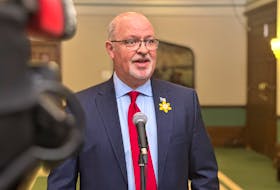
On Tuesday afternoon, Kevin Anderson, DFO’s Newfoundland and Labrador regional director general, issued a statement regarding Gillett’s form of protest.
“It is of course concerning when anyone takes a course of action such as the one Mr. Gillett is pursuing, and we share the public’s concern for his health,” Anderson’s statement reads.
In addition to a meeting with federal Minister of Fisheries, Oceans and the Canadian Coast Guard, Dominic LeBlanc, Gillett is also asking for an independent review of the science and management of all provincial fisheries and a review of the relationship between the Fish Food and Allied Workers union and the DFO.
Anderson stated that the minister “has been kept apprised” of Gillett’s hunger strike and the “situation” in this province.
In recent weeks, a number of protests have occurred around the island. Less than two weeks ago a group of shrimp fishermen stormed the DFO offices and on Tuesday morning in Port au Choix, harvesters set fire to fishing gear outside the DFO offices.
Regarding the management and science of the various fisheries, Anderson says that all decisions are made “in a transparent manner” and that DFO makes a point of inviting fish harvesters to join its scientists in “reviewing the state of fish stocks.”
“We have a robust consultation process that hears the views and opinions of representatives from all sectors of the fish industry, Indigenous groups, and other stakeholders, and takes these into account when making management decisions,” the statement reads.
“Our fisheries management decisions are evidence-based, and their ultimate goal is to conserve our important public resources so that they are available now and for future generations of Canadian fishers.”
Regarding the relationship with FFAW, Anderson says it’s the fish harvesters who elect their bargaining agents.
“DFO works collaboratively with whomever fishers choose to represent them.”








